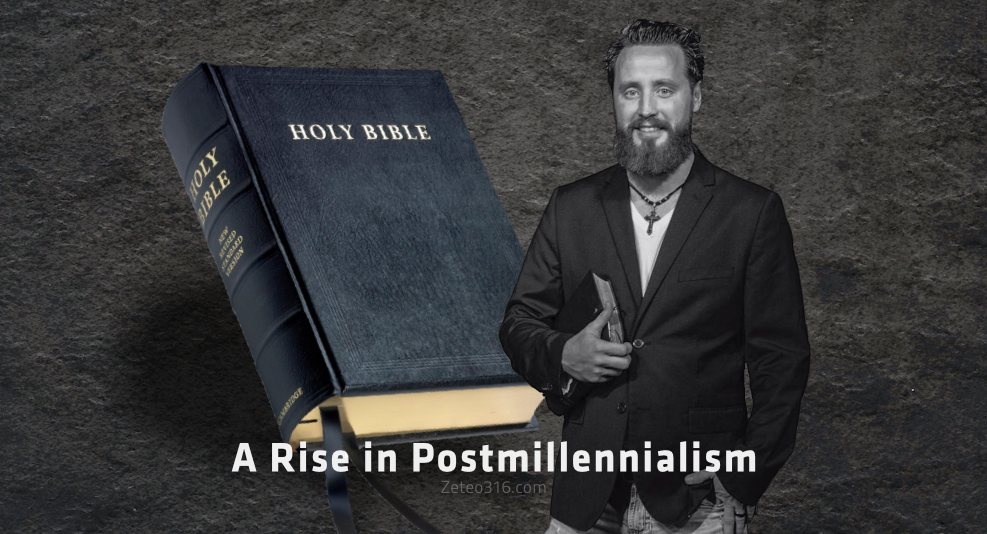
Lately I’ve been witnessing a rise in postmillennialism on social media. It’s ironic given the current dystopian state of the world. I can anticipate the postmil responses. In fact, I’ve seen them. As bleak as things may appear to us, God is in control and may turn it around.
But the question remains: what does Scripture teach about the events surrounding Christ’s Second Advent? Does it support the postmillennial view?
Against Dispensationalism
I suspect one reason for the current rise in popularity of postmil is “personality.” A few popular and influential folk are postmil (Doug Wilson etc). One example is apologist James White who went from premil (in his early days) to amil, and now postmil. White is now associated with Jeff Durbin of Apologia Church, which is postmil.
I’ve seen charges that the (pretrib) rapture is escapist, and that dispensationalism is pessimistic, heretical and dangerous – the usual baggage. Paul Henebury and Dan Phillips have responded HERE and HERE. See also this GotQuestions article.
I might once again note the heavy Scripture lifting done by the likes of Paul Henebury and Michael Vlach. Our Covenant Theology In my view, postmils have done less to support their contentions and charges, aside from inference and emotion.
Not long ago, Durbin made disparaging remarks about the rapture, premillennialism and the gospel (dispensationalism). Keith Sherlin, Luke Morrison and Brandon Garcia responded. They were irenic and on point. I’m assuming it’s OK to reproduce Keith’s introduction to their talk.
A Response to Jeff Durbin’s Erroneous Allegations
Keith Sherlin,
Prior to 1944’s great schism in the body of Christ between covenant theologians and dispensational theologians, evangelicals remained more united in their common effort to oppose liberalism in the culture. It should be this way today. Pastors Luke Morrison & Brandon Garcia joined in a Christicommunity Conversation to address the erroneous allegations Jeff Durbin has made against his premillennial brothers in the faith.
Covenant Theologian Ronald Henzel rightly stated of the premillennial movement that it has been a “powerful movement” composed of people with a “fervent commitment to evangelism” and “dedication to addressing social concerns” and such a reality serves as a “REBUKE to those” (like Durbin) who accuse them of “insulating themselves from the present world out of a preoccupation with the next.”
Likewise, Covenant Theologian Dr. O. Palmer Robertson stated that believers from the various eschatological positions (Covenant & Dispensational) stand “side by side in affirming the essentials of the Christian faith” while also standing in unison and “alone in opposition to the inroads of modernism, neo-evangelicalism, and emotionalism.” In his view, “Covenant theologians and dispensationalists SHOULD hold in highest regard the scholarly and evangelical productivity of one another.” Sadly, so far, Durbin does not seem to have this level of respect and admiration for his fellow partners in the gospel.
If only more Covenant theologians would have that same level of respect for their brothers who walk in the premillennial faith. His allegations lack merit, historical accuracy, and do not encourage healthy unity in the faith.
Dr. Charles Ryrie, one of the foremost Dispensational teachers of the movement, rightly stated that “there are few enough these days who believe in the fundamentals of the faith, and to ignore those who have declared themselves on the side of truth of God is unwise.” Alleging that Dispensationalists cannot properly carry out the great commission (one of several allegations by Durbin) ignores historical reality, misrepresents the leaders of the heritage, and establishes a needless dividing line in the body of Christ where one does not really exist.
May the Lord’s people, with a healthy and respectful acknowledgement in conversation of secondary differences, work towards greater levels of unity in Christ while collectively doing the great commission and opposing liberal ideology that temporally and eternally harms people. If we do that, we can better fulfill one of Jesus’ prayers: “that they may all be one; even as you Father, are in Me and I in you, that they may also may be in us, so that the world may believe that you sent me” (John 17:21).
Facebook link HERE
Kingdom Now?—A Presentation by David Moore
I don’t necessarily endorse everything in the PWMI series. But Moore’s presentation makes many valid observations.
Maranatha!
